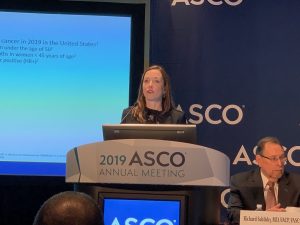
Dr Sara Hurvitz
The CDK4/6 inhibitor ribociclib has shown a survival benefit in younger women with advanced breast cancer, according to trial findings presented at ASCO 2019.
When added to standard endocrine therapy in premenopausal women with advanced hormone receptor positive cancer, ribociclib was associated with a significant improvement in overall survival rates compared to endocrine therapy alone, results from the MONALEESA-7 trial showed.
In the phase III trial, 672 women under the age of 59 with HR+/HER-advanced breast cancer were randomised to treatment with ribociclib or placebo in addition to standard endocrine therapy (goserlin and non steroidal aromatase inhibitors or tamoxifen).
After a median follow up of 34.6 months, 26% of women were still receiving the therapies, with 35% still receiving ribociclib and 17% placebo.
And at 42 months, overall survival rates were 70% for women who received ribociclib compared with 43% for women who received placebo (29% relative risk reduction).
Progression free survival rates were 23.8 months for women who received ribociclib and 13 months for placebo.
Lead study investigator Dr Sara Hurvitz of the UCLA Jonsson Comprehensive Cancer Center described the findings as “exciting” for younger women in whom advanced breast cancer is usually aggressive disease with a poor prognosis.
“This is the first study to show improved survival for any targeted therapy when used with endocrine therapy as a first line treatment for advanced breast cancer,” she said.
“The use of ribociclib as a front line therapy significantly prolonged overall survival, which is good news for women with this terrible disease.”
Speaking at an ASCO briefing, Dr Harold Burstein, an oncologist at the Dana-Farber Institute, Boston, said this is the first time a statistically significant improvement in OS has been observed with a CDK4/6 inhibitor in combination with endocrine therapy in patients with hormone receptor positive advanced breast cancer.
“This is an important study because it shows that a class of drugs we are already and which we know delay the time to disease progression, delay the time to chemotherapy and really double the effectiveness of endocrine therapy – now we are seeing that translate into a significant survival benefit for women who have ER+ breast cancer,” he said.
“It’s also significant because this study focused on young women. And while many people think of them as having different kinds of breast cancer such as triple negative breast cancer, in fact the most common form of breast cancer in young women is ER+ cancer – and this is the largest study in recent memory that has focused on younger women and shows that they too benefit from this class of drugs.
Dr Burstein added that the benefits might be a class effect of CDK4/6 inhibitors in breast cancer, but trials of other drugs in the class such as palbociclib had mostly involved postmenopausal women. The trends in outcomes such as PFS in younger women in these trials suggested the benefits were common to other drugs in the class, he said.
“I think one of the myths that this study helps suppress is that younger women with ER+ breast cancer have a fundamentally different outcome to older women – actually their outcomes look very similar,” he said.
“Advanced breast cancer in pre-menopausal women can be very aggressive, so it is important and encouraging to see a targeted therapy that significantly increases survival for younger women with this disease,” he concluded.
Ribociclib (Kisqali) was subsidised on the PBS in 2018 for women with metastatic breast cancer.
The study received funding from Novartis.